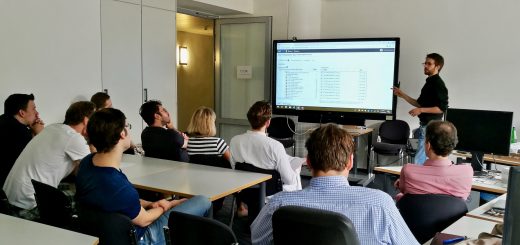September 25, 2017) – Today, Institute for Genome Statistics and Bioinformatics, IGSB, and the Institute of Human Genetics, IHG, Bonn, announce a new initiative to further precision medicine through integration with FDNA’s (www.FDNA.com) Face2Gene suite of applications. This integration is expected to dramatically increase and transform the diagnostic power of genetic testing in rare diseases, and is the first of its kind in Germany. In most instances, genetic testing of rare disease patients yields a diagnosis in only 25% of cases. This collaboration will augment genetic testing with facial analysis and artificial intelligence technologies that is expected to increase the diagnostic yield of molecular testing for thousands of rare diseases.
According to Prof. Markus Nöthen, head of the Institute of Human Genetics, rare disease patients are most often young children who, historically, would see an average of seven doctors over seven years before reaching a diagnosis. This odyssey may be considerably shortened when all available clinical data is efficiently transmitted to the diagnostic labs.
Prof. Peter Krawitz, head of IGSB, said “We are excited to integrate patient clinical data into our genetic interpretation pipeline to help find answers for the patient’s we serve. We expect Face2Gene’s facial analysis and phenotyping insights to make a significant impact on our molecular interpretation, ensuring University Hospital Bonn continues as a leading genetic services center.”
Face2Gene is used by clinical geneticists worldwide to evaluate syndromes, genes and phenotypes that correlate with patients’ facial and clinical analysis. The technology compares patient clinical phenotypes and facial analysis to known disease-causing genetic variants, supporting clinicians as they diagnose their patients. “We are proud to work with IGSB on a number of clinical, molecular and research activities,” said Dekel Gelbman, CEO, FDNA. “Bonn has proven to be a leader in genetics and rare diseases and we look forward to seeing our work
together make a meaningful impact on patient’s lives.”
About IGSB
The IGSB is a recently founded institute at the University of Bonn School of Medicine and the University Hospital Bonn, that collaborates with the Institute of Human Genetics on precision medicine. The IGSB is also leading the PEDIA study, which aims at improving exome interpretation by including results from automated image analysis. For detailed information about how to use PEDIA prioritization in the diagnostic workup, please contact pkrawitz@uni-bonn.de
About IHG
The IHG at the University of Bonn School of Medicine and the University Hospital Bonn is providing diagnostic services for a wide range of genetic diseases. For more information, visit https://www.humangenetics.uni-bonn.de.
About FDNA and Face2Gene
FDNA is the developer of Face2Gene, a clinical suite of phenotyping applications that facilitates comprehensive and precise genetic evaluations. Face2Gene uses facial analysis, deep learning and artificial intelligence to transform big data into actionable genomic insights to improve and accelerate diagnostics and therapeutics. With the world’s largest network of clinicians, labs and researchers creating one of the fastest growing and most comprehensive genomic databases, FDNA is changing the lives of rare disease patients. For more information, visit www.FDNA.com.
 University Hospital Bonn Announces New Technology To Advance Ability to Diagnose Rare Genetic Diseases in Children Institute for Genome Statistics and Bioinformatics and the Institute of Human GeneticsBecomes First in Germany to Integrate with U.S.-Based The Institute for Genome Statistics and Bioinformatics, IGSB, and the Institute of Human Genetics, IHG, Bonn, announce a new initiative to further precision medicine through integration with FDNA’s (www.FDNA.com) Face2Gene suite of applications. This integration is expected to dramatically increase and transform the diagnostic power of genetic testing in rare diseases, and is the first of its kind in Germany. In most instances, genetic testing of rare disease patients yields a diagnosis in only 25% of cases. This collaboration will augment genetic testing with facial analysis and artificial intelligence technologies that is expected to increase the diagnostic yield of molecular testing for thousands of rare diseases.
University Hospital Bonn Announces New Technology To Advance Ability to Diagnose Rare Genetic Diseases in Children Institute for Genome Statistics and Bioinformatics and the Institute of Human GeneticsBecomes First in Germany to Integrate with U.S.-Based The Institute for Genome Statistics and Bioinformatics, IGSB, and the Institute of Human Genetics, IHG, Bonn, announce a new initiative to further precision medicine through integration with FDNA’s (www.FDNA.com) Face2Gene suite of applications. This integration is expected to dramatically increase and transform the diagnostic power of genetic testing in rare diseases, and is the first of its kind in Germany. In most instances, genetic testing of rare disease patients yields a diagnosis in only 25% of cases. This collaboration will augment genetic testing with facial analysis and artificial intelligence technologies that is expected to increase the diagnostic yield of molecular testing for thousands of rare diseases. 

